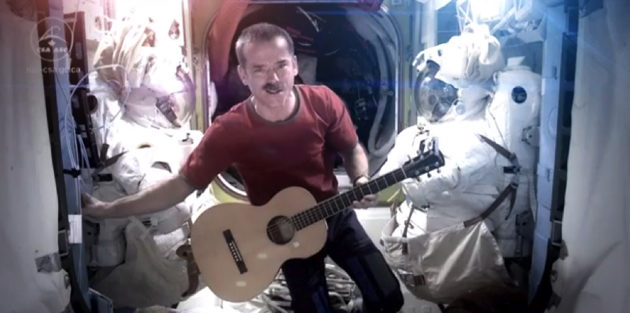Guitars, Eccentric Billionaires, and Space Travel by Andrew Heaton
Recently astronaut Chris Hadfield became a global music sensation without so much as a nipple slip. He jumped to stardom by a combination of guitar mastery and zero-g singing via a music video he made. In space.
It’s certainly an odd way of carving a niche in the country-music industry. The standard career track is to develop guitar skills and a drinking problem simultaneously, then write songs about both until you wind up in Nashville. Very few astronauts ever wind up with Grammys—Neil Armstrong never even got nominated. Going through rigorous astronaut training in order to be blasted through the stratosphere in a billion-dollar tin can seems like roundabout career planning, but perhaps that’s the standard course for Ontario musicians. I don’t know.
While the spacefaring Canuck might have performed his orbital David Bowie tribute as a hobby and not for personal advancement in entertainment, his achievement nonetheless synthesizes a phenomenon that might define humanity’s future: combining space travel with the entertainment industry. In fact the next big fusion of the two is already under way.
Most of the space program thus far has been funded with tax dollars. American space exploration began when the Eisenhower administration found itself with a surplus of Nazi rocket scientists. After defeating Hitler, the United States and the Soviet Union snatched up every Raketenforscher they could get their hands on, only to realize they had dozens of German guys in lab coats sitting on their hands all day doing nothing. Eisenhower couldn’t stand layabouts, so he dared the co-opted Germans to see if they could launch random, blinking, metal objects—like a refrigerator, or a Winnebago—into space.
Four years later NASA leaped ahead in the space race when President Kennedy suspected that there might be women on the moon. We spent eight years and $25 billion figuring out how to get to the moon and potentially introduce its inhabitants to JFK. By the time we actually landed there, Nixon had become president, so the space program’s main priority shifted to finding novel locations in which to play golf. Then, in the 1980s the Russians ran out of dogs to launch into space, thus formally concluding the Cold War.
Now, in the 21st century, space travel has reached a new and glorious apex: It has been privatized.
You might ask, “What does privatizing space exploration mean to me?” Well, it means that now everyonegets a crack at bagging moon babes. And because eccentric moguls are pairing their insane intergalactic ambitions with the profit motive, we will probably build a moon base before you can say “President Gingrich.”
Elon Musk, the billionaire tech mogul who founded PayPal, intends to retire on Mars. And he means it. Richard Branson of Virgin Records has graduated from building trains to building rocket planes by forming Virgin Galactic. Director James Cameron and Google’s Larry Page are combining forces and investment capital in an asteroid mining company, which will drag asteroids full of platinum and gold back to Earth.
While the startup costs are immense, the profit margin is likewise staggering. There are gold nuggets the size of Houston drifting around the asteroid belt, just waiting to cloak the teeth of Lil Wayne. Enough so that, somewhat ironically, if Cameron and Page pull it off, we could see gold become less valuable than copper within our lifetimes. Rappers would have to resort to other forms of swag, like wearing antique brooches.
An even more fascinating development is Mars One, which seeks to build a permanent settlement on Mars. The brilliance of Mars One is that they are combining the highest of human aspirations (real estate investment) with the lowest of human depravity (reality television). Mars One will acquire part of the funding needed to send four people to Mars in 2022 by offering the film and licensing rights to private investors.
Adam Smith (who did not live on Mars or the moon) stated that government has four functions, the last of which is to fund activities that could not be handled by the private sector, or for which the private sector could not aggregately muster sufficient capital. Space exploration used to fit this bill: In 1957 no single company could have drummed up the necessary funding to launch probes into space. Only a government hell-bent on beating the Russians at everything from chess to rockets could possibly have done so.
Now space exploration has matured and is swiftly becoming the purview of wealthy entertainment moguls. This is the best possible thing that could happen to mankind. Within our lifetimes we will have orbital rocket planes that render flights to Australia brief and palatable. Someday I could send my children to space camp on the moon if I want peace and quiet in my house over the summer.
And all of us, if sufficiently photogenic and entertaining, have a crack at living on Mars. I’m hoping Chris Hadfield will apply, because I think an album about traveling to Mars would be worth purchasing. I would definitely tune in to watch a show featuring him and Megan Fox on a rocket.
ABOUT ANDREW HEATON
Andrew Heaton is a former congressional staffer, now working as a writer and standup comedian in New York City. He is the author of From the Monkey Cage: Fixing Politics With Wit & Cartoons. More of his wit and insight can be found at his website, MightyHeaton.com.


